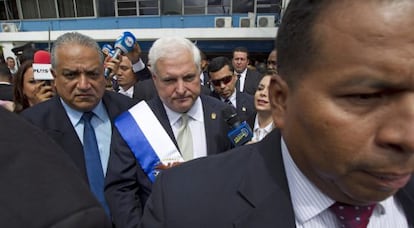Panama’s president to visit Spain to “demand” support for canal work
Public Works Minister Ana Pastor is in talks with Panama's minister for canal affairs

Panamanian President Ricardo Martinelli will be traveling to Madrid and Rome shortly to “demand” that the governments of Spain and Italy live up to their “moral responsibility” in connection with the Panama Canal extension project.
The project to build a third set of locks to expand the canal's capacity was awarded to an international consortium called Grupo Unidos por el Canal (GUPC), made up of Spain's Sacyr Vallehermoso, Italy's Impregilo, Belgium's Jan de Nul and Panama's own Constructora Urbana.
The private consortium, which is headed by Sacyr, has threatened to halt work on January 20 because the Panamanian government is not accepting cost overruns of around 1.2 billion euros over the initial budget.
Martinelli said he will travel to Spain and Italy in the company of executives from the Panama Canal Authority (ACP), the state agency in charge of the waterway. However, he failed to specify any travel dates.
Martinelli says Spain and Italy most live up to their “moral responsibility” in connection with the Panama Canal extension project.
The president, who took office in 2009, said that Spanish and Italian government heads told him at the time that they would guarantee support for the canal expansion, since the goal is “for the work to continue.”
Spain's ambassador to Panama, Jesús Silva, warned on Thursday that a breach of the contract will cause “greater losses” and said it is understandable if the conglomerate is unable to assume the financial impact of the additional expenses.
Any cost overruns will be “easy to amortize” because the extension will allow the Canal to quickly recoup the investments, added Silva. “Losses will be much greater if there is no agreement. I think a greater effort could be made; I believe there has been a lack of openness to dialogue.”
Public Works Minister Ana Pastor is in talks with Panama's minister for canal affairs, Roberto Roy, and with Sacyr representatives to find “the best possible solution” to the conflict.
On Wednesday, the ACP rejected “pressure” from the conglomerate, claiming that its warning that it would halt work on January 20 was a way to “force” Panama to negotiate outside the terms of the contract, the state news agency reported.
In an interview with Spanish radio station SER on Thursday, Jorge Quijano, the administrator of the canal, explained that the huge difference between the initial budget presented by GUPC and those of other bidders was due to “the fact that the designs were very different.”
Quijano insisted that the ACP “honors its payment commitments within 15 days of receiving the invoices” and said they would accept the cost overruns as long as they considered them to be justified, or if the arbitration agencies rule in favor of the consortium. “All we hope is that the other contracting party will also respect its contract commitments.”
The consortium was created in 2009 to bid for construction of a third set of locks for the Panama Canal for 2.27 billion euros. GUPC began work in August of that same year. The total cost of the extension is around 3.84 billion euros.
GUPC has said it wants to negotiate a “fair and appropriate” formula and solve the project's “great financial problems.”
Tu suscripción se está usando en otro dispositivo
¿Quieres añadir otro usuario a tu suscripción?
Si continúas leyendo en este dispositivo, no se podrá leer en el otro.
FlechaTu suscripción se está usando en otro dispositivo y solo puedes acceder a EL PAÍS desde un dispositivo a la vez.
Si quieres compartir tu cuenta, cambia tu suscripción a la modalidad Premium, así podrás añadir otro usuario. Cada uno accederá con su propia cuenta de email, lo que os permitirá personalizar vuestra experiencia en EL PAÍS.
¿Tienes una suscripción de empresa? Accede aquí para contratar más cuentas.
En el caso de no saber quién está usando tu cuenta, te recomendamos cambiar tu contraseña aquí.
Si decides continuar compartiendo tu cuenta, este mensaje se mostrará en tu dispositivo y en el de la otra persona que está usando tu cuenta de forma indefinida, afectando a tu experiencia de lectura. Puedes consultar aquí los términos y condiciones de la suscripción digital.








































